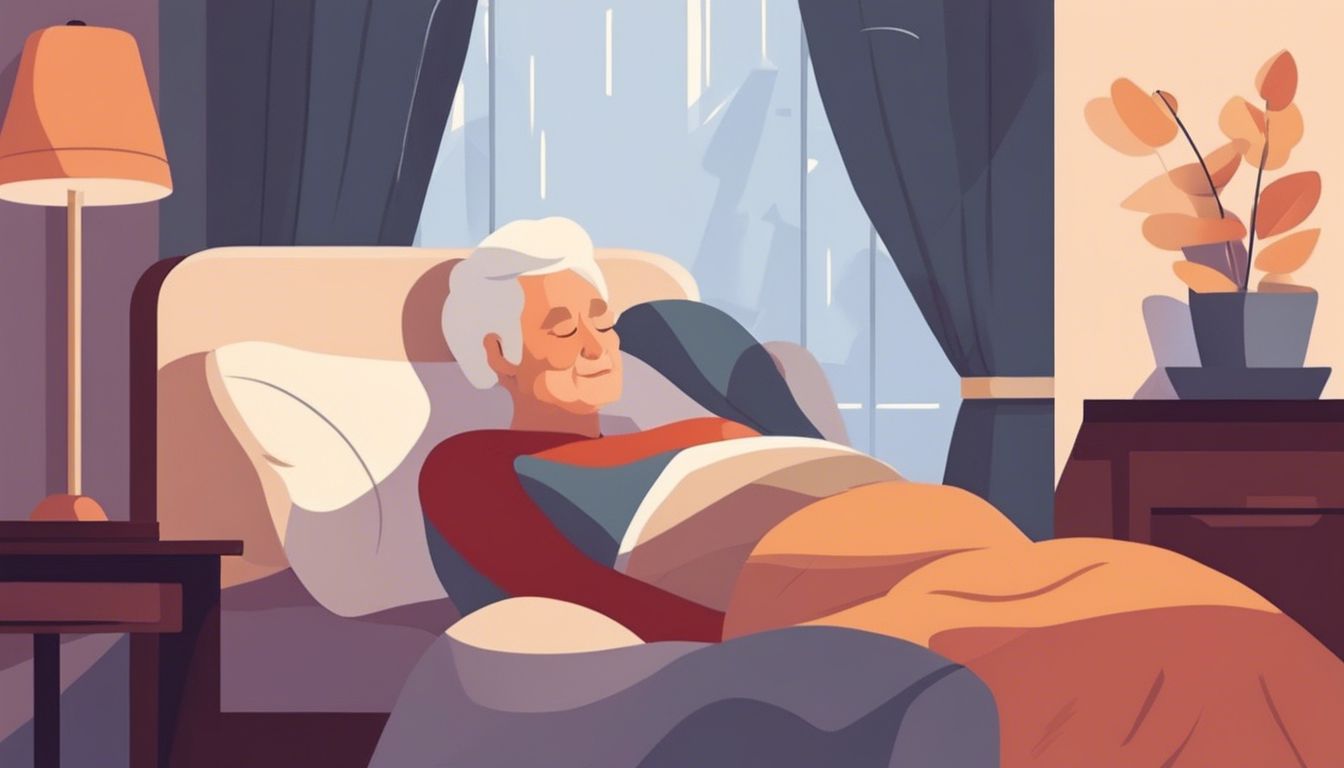Struggling to sleep well is a common problem for caregivers. Around 70% of them report sleep issues. This article offers tips to improve sleep quality, focusing on practical strategies and tools.
Read on for helpful advice.
Key Takeaways
- Caregivers often don’t sleep well because of their job. About 70% have trouble sleeping.
- Doing things like setting a regular bedtime, making the room dark and quiet, and using relaxation techniques can help improve sleep.
- Eating foods that are good for sleep, cutting out caffeine before bed, and doing regular exercise like yoga or walking can also make sleeping easier.
- Tools like apps for meditation or devices that track how you sleep can show what changes to make for better rest.
- Talking to a professional about stress or joining support groups can support mental health and improve sleep quality.
Understanding the Impact of Caregiving on Sleep

Caregivers often find sleep hard to come by. Stress and job demands mess with their rest, hurting both mind and body.
Common sleep disturbances among caregivers
Many caregivers face sleep disturbances due to their duties. Around 70% of them, especially those looking after people with dementia, struggle with sleeping issues. They often sleep less than seven hours each night.
Also, 41% get woken up by the person they care for. This leads to trouble sleeping through the night without interruption.
Caregivers deal with various sleep problems like not getting enough sleep, waking up too many times at night, and feeling very tired in the morning. These issues come from the need to respond to the care receiver’s needs at odd hours.
Plus, stress and worry about their loved one’s health add to these sleeping troubles.
Psychological and physical effects of sleep deprivation
Sleep deprivation hits hard. It can lead to obesity, high blood pressure, and heart disease. People not getting enough sleep often feel sad or get angry easily. They also may find it hard to pay attention or make decisions.
Caregivers waking up a lot at night might feel more down, studies show.
Losing sleep can make you gain weight.
Not sleeping enough changes how our bodies work. For example, it can make us crave food that is not good for us—like snacks high in sugar or fat. Our chances of getting sick go up too because our immune system gets weaker.
Plus, being tired all the time can cause accidents at home or when driving.
Practical Strategies to Enhance Sleep Quality
To get better sleep, try sticking to a same bedtime and wake-up time every day. Also, make your sleeping area peaceful and free from distractions.
Establishing a regular sleep schedule
Maintain a regular bedtime schedule to sleep better. Create a sleep environment that is dark, quiet, and slightly cool for quality rest.
- Go to bed at the same time each night.
- Wake up at the same time every morning.
- Make your bedroom dark with curtains or blinds.
- Keep the room quiet, use earplugs if needed.
- Set your thermostat to keep the room cool.
- Use a comfortable mattress and pillows.
- Avoid screens an hour before bed to reduce blue light exposure.
- Limit naps during the day to improve nighttime sleep.
Next, look at how creating a conducive sleep environment can make a big difference.
Creating a conducive sleep environment
Caregivers need good sleep to stay healthy. Making your bedroom right for sleep can help.
- Keep the room cool and dark. Use curtains or shades to block out light.
- Pick a comfortable mattress and pillows. They support better sleep.
- Use earplugs or a white noise machine for a quiet space.
- Put away phones and screens an hour before bed. They can make it hard to fall asleep.
- Try aromatherapy with lavender scent. It helps you relax.
- Avoid large meals, caffeine, and alcohol before bedtime. They can keep you awake.
- Make time for winding down, like reading or deep breathing, to prepare your body for sleep.
Next, let’s talk about ways caregivers can manage stress for better sleep.
Behavioral Interventions
Behavioral changes can make a big difference in sleep quality. Methods like Cognitive Behavioral Therapy for Insomnia and stress-reduction practices help calm the mind for better rest.
Cognitive Behavioral Therapy for Insomnia (CBT-I)
Cognitive Behavioral Therapy for Insomnia (CBT-I) helps caregivers who can’t sleep well. This treatment teaches you to change thoughts and actions that mess with your sleep. For example, it tackles habits that keep you awake like worrying in bed or using phones before sleep.
You learn new ways to relax and set up a sleep schedule.
CBT-I also focuses on stopping bad thoughts about sleeping that make insomnia worse. It uses methods like relaxation exercises and changing your bedtime routine. Many people see big changes in how they sleep after going through CBT-I sessions.
Change your thoughts, improve your sleep.
Next, we talk about relaxation techniques and mindfulness meditation.
Relaxation techniques and mindfulness meditation
After exploring Cognitive Behavioral Therapy for Insomnia, let’s focus on relaxation techniques and mindfulness meditation. These strategies can play a big role in improving sleep.
- Practice deep breathing exercises every day. Spend 10 minutes focusing on slow, deep breaths to calm the mind.
- Set aside time for meditation each morning or evening. Use apps like Headspace or Calm to guide you if needed.
- Try progressive muscle relaxation before bed. Tighten then relax each muscle group, starting from your toes up to your head.
- Listen to soothing music or natural sounds as you prepare to sleep. Sounds of rain, oceans, or soft music can help ease into sleep.
- Engage in gentle yoga stretches that promote relaxation. Focus on poses that release tension.
- Keep a gratitude journal by your bed. Write down three things you’re thankful for each night to end the day on a positive note.
- Use essential oils like lavender in a diffuser in your bedroom; they can aid in relaxation.
- Prioritize daily exercise, but avoid vigorous activities close to bedtime as it might keep you awake.
- Follow a consistent routine before bed that includes some of these practices to signal your body it’s time to wind down.
Adopting these habits can significantly improve the quality of rest for caregivers dealing with daytime stress and responsibilities.
The Role of Physical Activity
Moving your body can change how well you sleep. Regular workouts, like walking or yoga, make it easier to fall and stay asleep.
Influence of regular exercise on sleep quality
Exercise aids in improving sleep quality. It creates a healthy exhuastion. The more active you are during the day, the more your body requires rest at night. This is applicable to caregivers as well.
They frequently experience stress and difficulties in sleeping. Nonetheless, consistent walking, yoga, or any form of activity can be quite beneficial.
Moderate exercise greatly improves sleep quality.
Physical activity enhances the fluctuation of the heart rate. Though it may sound intricate, it is quite straightforward. A heart that has a healthy and steady rhythm promotes better sleep.
Activities such as jogging ensure the heart’s health and a tranquil sleep.
Best types of exercise for relaxation before bedtime
Daily exercise helps you sleep better. A calming routine before bed makes a big difference. Here are the best types:
- Yoga calms the mind and body. It eases stress and prepares you for sleep.
- Walking at a slow pace outside can help clear your head and relax your muscles.
- Gentle stretching reduces muscle tension. It helps prevent waking up with aches.
- Tai Chi combines slow movements and deep breaths. This improves sleep quality.
- Pilates focuses on core strength and flexibility. It also promotes relaxation before bedtime.
- Swimming with slow laps is soothing. The water’s support eases joint stress.
Use these exercises to find peace and improve your night’s rest.
Nutritional Approaches to Improve Sleep
Eating right can lead to better sleep. Cut down on coffee late in the day, and add sleep-friendly foods like cherries and milk to your dinner.
Foods and beverages that promote better sleep
Caregivers need good sleep to handle their duties. Foods and drinks can improve sleep quality.
- Almonds and walnuts contain melatonin, aiding in better sleep.
- Warm milk has tryptophan that turns into serotonin, making you sleepy.
- Chamomile tea relaxes nerves and muscles, leading to restful sleep.
- Turkey is rich in tryptophan too, helping you fall asleep faster.
- Fatty fish like salmon boost vitamin D and omega-3s, improving sleep quality.
- Kiwi offers antioxidants and serotonin, which help with sleep patterns.
- Tart cherry juice increases melatonin levels for a better night’s rest.
Next, we’ll discuss avoiding stimulants close to bedtime for uninterrupted sleep.
Avoiding stimulants close to bedtime
Sleeping well is tough for caregivers. Cutting out stimulants before bed helps a lot. Here’s how:
- Stop drinking coffee and other caffeinated drinks at least 6 hours before bed. Caffeine can keep you awake.
- Avoid chocolate and soda in the evening. They have caffeine too.
- Don’t drink alcohol close to bedtime. It might seem relaxing, but it actually harms sleep quality.
- Skip heavy, spicy, or fatty foods late at night. They can upset your stomach and disturb your sleep.
- Check your meds; some may contain stimulants that affect sleep. Talk to your doctor about this.
- Use calming herbal teas like chamomile or peppermint as evening drink choices instead of coffee or tea with caffeine.
Next, let’s explore creating a good sleep environment for better rest.
The Importance of Mental Health Support
Taking care of your mind is as crucial as taking care of your body, especially for caregivers. Support groups, therapy from a psychologist, and stress management can make a big difference.
Addressing anxiety and stress through professional help
Seeking help from mental health experts can lower stress. Doctors or therapists provide support and treatment options for mental health conditions such as depression and anxiety. They might suggest medicine to promote better sleep or therapy sessions for managing caregiver burden.
Support groups also offer a space to share experiences with others facing similar struggles. It helps in realizing you’re not alone in your journey. Counseling can equip caregivers with ways to handle their emotions more effectively, improving their overall well-being.
A problem shared is a problem halved.
Support groups and counseling for caregivers
Moving from tackling stress with professional help, joining support groups and seeking counseling can offer real benefits for caregivers. Support groups provide a safe space to share experiences with others who understand the caregiver’s journey.
They discuss common problems like fatigue, anxiety, and how to handle care-related tasks. Counseling offers one-on-one support to work through personal feelings of stress or burnout.
These options connect caregivers with resources that can improve their mental health. For example, counselors trained in handling caregiver issues might suggest techniques for better sleep or managing daily duties.
In support groups, members often exchange tips on relaxation practices or finding time for self-care amidst caregiving responsibilities. Both settings give caregivers tools and community backing they need to maintain their well-being while supporting others.
Technological Aids and Tools
Tech can help you sleep better. Sleep trackers and apps make it easier to find peace at night.
Sleep tracking devices
Sleep tracking devices like fitness bracelets and smartwatches can help. They show how much you sleep and how well you do it. These tools measure when you’re in light, deep, or REM sleep.
They also count how many times you wake up at night. This info helps spot problems with your sleep.
You can use this data to make changes and improve your rest. For example, if the device says you wake up a lot at 2 AM, maybe a noise is disturbing you then. Or if it shows you hardly get any deep sleep, maybe your room isn’t dark enough.
Changing these things can lead to better sleep.
Apps for meditation and sleep enhancement
Many apps can help caregivers find peace and better sleep. Apps like Calm and Headspace offer meditation guides. These programs teach deep breathing and relaxation skills. They make falling asleep easier.
Using these apps right before bed can improve sleep quality.
Caregivers might also like sleep tracking devices that work with smartphone apps to monitor sleep patterns, such as the Fitbit or Apple Watch. By understanding their sleep habits, caregivers can make changes for better rest.
For example, they might learn they need a more regular bedtime or to avoid caffeine late in the day.
Making the Caregiver’s Bedroom More Functional
A good sleep space is key. Make sure the room is dark, quiet, and cool. Use curtains that block light well. A comfortable bed also helps a lot.
Think about getting help at night. This could be hiring someone or finding a support group. It lets you rest better, knowing someone else can help care for your loved one.
Conclusion
Improving sleep for caregivers is sure. Stick to a bedtime routine and wake up at the same time every day. Make your sleeping space quiet, dark, and cool. Try calming habits like reading before bed.
Exercise regularly but not right before sleep. Eat foods that help you rest and avoid caffeine late in the day. Seek support if stress keeps you awake, whether through groups or therapy.
Use apps or devices to track sleep patterns. These steps can lead to better rest, making caregiving a bit easier.
For more tips on creating the perfect restful space, check out our guide on how to make a caregiver’s bedroom more functional.
FAQs
1. What are common sleep disorders experienced by caregivers?
Caregivers, especially family caregivers and those caring for people with dementia or chronic illnesses like stroke, heart failure, Alzheimer’s disease, and Parkinson’s disease often experience sleep disorders such as insomnia symptoms and sleep apnea.
2. How can lack of sleep affect the health of caregivers?
Chronic sleep deprivation in caregivers can lead to serious health problems including increased nervousness, psychosocial distress, lower medication adherence rate and even comorbidities.
3. Can researchers measure the quality of a caregiver’s sleep?
Yes! Researchers use tools like Pittsburgh Sleep Quality Index or objective sleep measures using devices like Actiwatch to determine total sleep time, nocturnal awakenings and other aspects related to the quality of a caregiver’s rest.
4. Are there studies that provide solutions for improving caregivers’ sleeping problems?
Indeed! Systematic reviews and meta-analysis from sources such as PubMed suggest solutions ranging from pharmacotherapy using medicines like Donepezil to behavioral therapy interventions aimed at improving total slept time.
5. Can natural methods improve a caregiver’s quality of rest?
Absolutely! Techniques such as acupressure administered by an acupuncturist have shown potential in addressing causes of insomnia among carers according to randomised controlled trials cited on AARP.org.
6. What are some tips for enhancing a caregiver’s night-time routine?
Maintaining good hygiene before bed is crucial… Avoiding alcohol intake – which could cause you to stop breathing momentarily while asleep – helps too… Also consider adopting strategies suggested by systematic reviews on reducing rumination or worry that might be impacting your chronotype – your body’s natural inclination towards morningness or eveningness.









